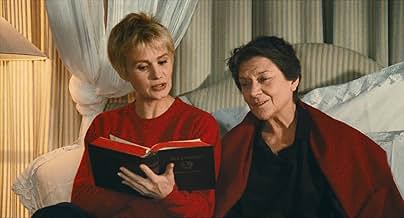CALIFICACIÓN DE IMDb
7.0/10
1.9 k
TU CALIFICACIÓN
Constance lee la novela en voz alta en la cama a su amante. Inspirada por la historia de Marie, una mujer que anuncia sus servicios como lectora de literatura, Constance decide hacer lo mism... Leer todoConstance lee la novela en voz alta en la cama a su amante. Inspirada por la historia de Marie, una mujer que anuncia sus servicios como lectora de literatura, Constance decide hacer lo mismo.Constance lee la novela en voz alta en la cama a su amante. Inspirada por la historia de Marie, una mujer que anuncia sus servicios como lectora de literatura, Constance decide hacer lo mismo.
- Dirección
- Guionistas
- Elenco
- Premios
- 4 premios ganados y 8 nominaciones en total
María Casares
- La veuve du général
- (as Maria Casarès)
- Dirección
- Guionistas
- Todo el elenco y el equipo
- Producción, taquilla y más en IMDbPro
Opiniones destacadas
This is a slightly bizarre film, a bit like a pretentious European soft porno movie from the 1970ies, minus the sleaze. I have seen it before in a dubbed version, back when it first came out, and didn't get it -- the movie relies heavily on the original dialogue. This time I saw the French version, and, although I still can't say that I managed to penetrate into the story's every nook and cranny, I can testify that the dialogue is quite witty, the wit is farcical, and Miou-Miou is adequately sensual. And that's more than you can say for most movies these days. It won't make it into my personal list of desert island films, but I'm genuinely glad to have given it another go.
I just rewatched this as I was converting it from my ancient cable taped vhs to dvd-r. Shinwa's comments describe this film about as well as one can in a capsule review. Or mabye I'm just becoming older and more curmudgeonly. The literary components seem like they were derived in the manner of Surrealist poetry-- chop up a bunch of sentences cut from books and magazines and pull them from a bag one at a time. Certainly there is no moral triumph taking place because Constance/Marie won't read Sade to a bunch of geezers. In fact, it's a cop-out to the "profession" she's field testing, kind of like a librarian not adding books to the collection because of personal bias. What I enjoyed most about this film is the soundtrack, and the wonderful settings. Love those old world cramped French streets and crumbling buildings with bad plumbing, which we see every time Constance goes trekking between appointments. Now if you want real French comedy, watch for Alexandre le bienheureux if it's ever released on video.
The output of director Michel Deville is difficult to categorise, assuming one feels the need to do so. He is nothing if not varied. Between 1985 and 1988 he gave us the erotic thriller 'Peril en la Demeure', probably his most successful film, followed by the bizarre and surreal 'Paltoquet' which must be accounted a noble failure and finally the delightful 'La Lectrice'.
This is to my knowledge the only one of Raymond Jean's novels to be filmed so all credit to Michel and Rosalinde Deville for spotting the potential. It is the type of film generally referred to as being 'very French'. If by that is meant stylish, literate, well-constructed, tastefully erotic and caring more about character than plot then it certainly qualifies.
It is essentially about where reality finishes and fantasy begins as Constance the book lover and Marie the professional book reader, both played by the sensuous and enchanting Miou-Miou, call to mind very strongly William Styron's observation that 'one lives several lives while reading.'
The rather quirky clients who hire her to read aloud to them prefer subject matter that reflects their lives and predilections. The handsome young man confined by an accident to a wheelchair asks her to read one of Baudelaire's most erotic poems, one of six of his that were banned in 1857. The lonely businessman has a taste for pornography but has to settle for 'The Lover' of Duras although in his case Marie's actions speak louder than words. The general's widow loves the prose of Karl Marx(!?) whilst the magistrate has a penchant for de Sade's '120 Days of Sodom.' The expression on Marie's face when her eyes light upon the extract he has chosen is absolutely priceless.
As the businessman Patrick Chesnais picked up a César and in the cast are two splendid representatives of the 'old school' namely Pierre Dux as the magistrate and Maria Casares as the widow.
The Production Design and Art Direction are superb and Deville again utilises classical music to great effect. Here it is Beethoven who does the honours.
This piece is really to do with the power of words and how vital they are in both enriching the mind and unlocking the imagination. As such, alas, it is a voice crying in the wilderness to so many of the current generation who spend their waking hours glued to screens.
This is to my knowledge the only one of Raymond Jean's novels to be filmed so all credit to Michel and Rosalinde Deville for spotting the potential. It is the type of film generally referred to as being 'very French'. If by that is meant stylish, literate, well-constructed, tastefully erotic and caring more about character than plot then it certainly qualifies.
It is essentially about where reality finishes and fantasy begins as Constance the book lover and Marie the professional book reader, both played by the sensuous and enchanting Miou-Miou, call to mind very strongly William Styron's observation that 'one lives several lives while reading.'
The rather quirky clients who hire her to read aloud to them prefer subject matter that reflects their lives and predilections. The handsome young man confined by an accident to a wheelchair asks her to read one of Baudelaire's most erotic poems, one of six of his that were banned in 1857. The lonely businessman has a taste for pornography but has to settle for 'The Lover' of Duras although in his case Marie's actions speak louder than words. The general's widow loves the prose of Karl Marx(!?) whilst the magistrate has a penchant for de Sade's '120 Days of Sodom.' The expression on Marie's face when her eyes light upon the extract he has chosen is absolutely priceless.
As the businessman Patrick Chesnais picked up a César and in the cast are two splendid representatives of the 'old school' namely Pierre Dux as the magistrate and Maria Casares as the widow.
The Production Design and Art Direction are superb and Deville again utilises classical music to great effect. Here it is Beethoven who does the honours.
This piece is really to do with the power of words and how vital they are in both enriching the mind and unlocking the imagination. As such, alas, it is a voice crying in the wilderness to so many of the current generation who spend their waking hours glued to screens.
Our heroine Constance (played by Miou-Miou in yet another role where she seems to play the same character as always...herself) turns her passion for literature into an exciting and profitable "profession". Her little newspaper advertisement eventually brings her a variety of eccentric clients who take advantage of this young woman's services (literally). Hired to read to the disabled, the elderly and the bored, Constance creates, fulfills and participates in her employers' fantasies and peculiar dreams. Warned by the clerk who helped her with the initial advertisement not to be surprised if her ventures yield complications and trouble, Constance seems to not only meet the challenge, but to enjoy the sense of danger and surprise.
The degree of tolerance and acceptance of human sexuality displayed in this film may appear over-the-top to viewers unfamiliar with French culture, and French society's extremely liberal social mores. This film was produced in the 1980s, not the 60s (you'd never know it). The "anything goes" mentality is likely to perplex the average viewer, and it may even offend some. The twisted freshness and daring situations eventually seem gratuitous. We "get it" pretty early on, yet the soft-core peep show continues throughout the film. The intertwining of actual literary passages and storyline are fascinating. Unfortunately my fascination with this film ends there.
The degree of tolerance and acceptance of human sexuality displayed in this film may appear over-the-top to viewers unfamiliar with French culture, and French society's extremely liberal social mores. This film was produced in the 1980s, not the 60s (you'd never know it). The "anything goes" mentality is likely to perplex the average viewer, and it may even offend some. The twisted freshness and daring situations eventually seem gratuitous. We "get it" pretty early on, yet the soft-core peep show continues throughout the film. The intertwining of actual literary passages and storyline are fascinating. Unfortunately my fascination with this film ends there.
10mew-4
Our protagonist, played by Miou-Miou, is a mischievous, whimsical and smart young woman who is looking for an occupation that will engage her. The adventures she has during her fantasies of what the job as a travelling reader would be, are charming little trips that we take with her. This is a smart and engaging little film. I dare you to not fall in love with her or this film.
¿Sabías que…?
- TriviaFrance's official submission to the 1989's Oscars in the Best Foreign Language Film category.
Selecciones populares
Inicia sesión para calificar y agrega a la lista de videos para obtener recomendaciones personalizadas
- How long is The Reader?Con tecnología de Alexa
Detalles
Taquilla
- Total en EE. UU. y Canadá
- USD 699,397
- Total a nivel mundial
- USD 699,397
Contribuir a esta página
Sugiere una edición o agrega el contenido que falta

Principales brechas de datos
What is the English language plot outline for La Lectrice (1988)?
Responda























